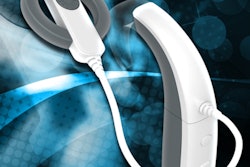
South Korean researchers are sending out a warning about the use of MRI in patients with cochlear implants after discovering that the strong electromagnetic field from 1.5- and 3-tesla scanners could cause pain and discomfort, as well as displacement of the cochlear implant magnet.
In a study published online November 20 in JAMA Otolaryngology -- Head and Neck Surgery, lead author Dr. Bo Gyung Kim, PhD, from Soonchunhyang University College of Medicine, and colleagues evaluated records from 18 patients with cochlear implants who had MRI scans between 2003 and 2014 at one facility.
Sixteen patients received 1.5-tesla scans and two had 3-tesla exams. The studies included 12 brain scans and 18 scans of other areas of the body.
Of the 18 patients, 13 (72%) completed their MRI scan with no complications (25 of 30 scans, or 83%). Five patients (27%) fitted with protective head bandages could not complete their MRI because of pain; one of these patients experienced displacement of the cochlear implant magnet.
Another patient tolerated the pain and discomfort of her third MRI scan, despite having gauze bandages, but she experienced magnet polarity reversal.
The two patients who underwent 3-tesla scans had no bandaging and experienced no adverse events or complications, despite the greater magnet strength. One of the two patients had an MRI of the knee, while the other had an MRI of the shoulder and did report some discomfort.
Fortunately, hearing-related performance was not affected in three patients who had major adverse events associated with the scans.
"Our data clearly demonstrate that a significant proportion of patients experienced discomfort or pain during the MRI process and were unable to complete the scans," the authors wrote. "Therefore, in addition to device safety and image quality, patient comfort should be considered when performing MRI procedures."
In a related commentary, Dr. Emanuel Kanal, director of MR services at the University of Pittsburgh, wrote that the study reinforces the lesson that not every patient can tolerate an MRI scan, for a variety of reasons.
"[Kim and colleagues'] reminder to consider not just mere safety, but also morbidity and acceptability to the patient, is refreshing indeed," Kanal wrote. "This should be added to our list of considerations prior to determining any risk-benefit assessment and patient scan recommendations regarding exposure of patients with implants to MRI environments."



















